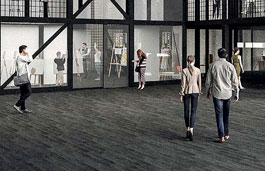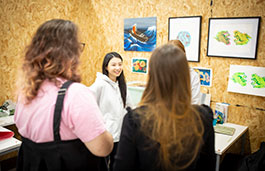Search
Architectural Technology BSc (Hons) / Architectural Design and Technology MSci
Study level: Undergraduate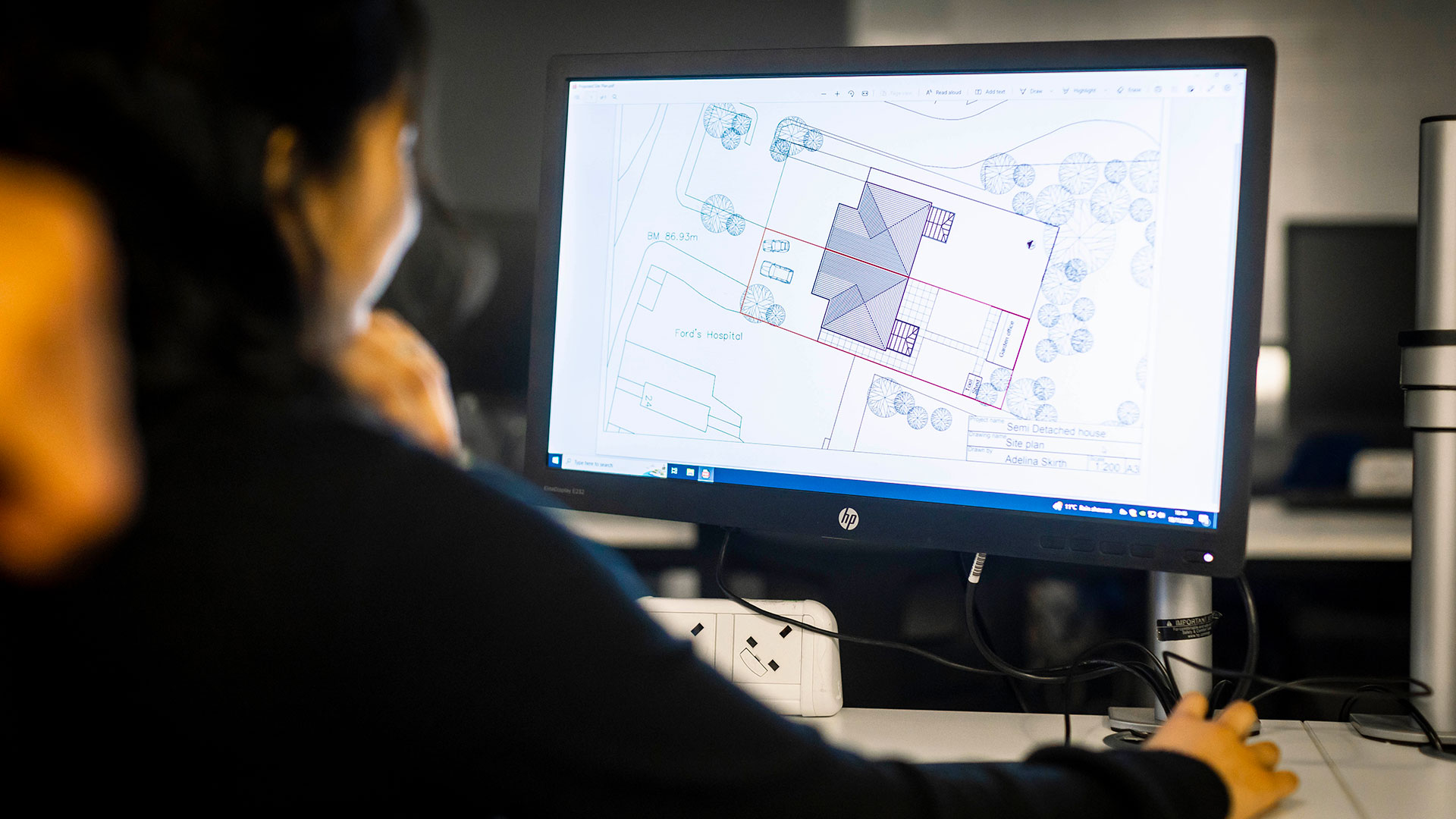
Bring your design ideas to life on this practical course that blends architecture, technology, and sustainability. Use creativity, innovation, and digital tools to tackle projects inspired by real-world design challenges.
Course features
Course option
Year of entry
2026-27
Location
Coventry University (Coventry)
Study mode
Full-time
Sandwich
Duration
BSc:3 years full-time4 years sandwich
MSci:4 years full-time5 years sandwich
UCAS codes
BSc (Hons): K130
MSci: K131
Start date
September 2026
November 2026
January 2027
March 2027
May 2027
July 2027
Course overview
Develop interdisciplinary skills and sustainability knowledge through collaborative projects in this research-driven, industry-connected programme. You will explore innovative design concepts and gain project-based experience relevant to careers in architecture, urban planning, and construction.
- Build your creative design skills while gaining hands-on knowledge of architectural technology, helping you prepare for a wide range of roles in architecture and construction.
- This course combines design, technology and teamwork across disciplines, aiming to help you understand real-world challenges in the architecture and construction industries.
- Designing creative, sustainable buildings that not only look great, but also work well for users, meet regulations, stay within budget and consider the environment at every stage.
Rated Gold Overall
Teaching Excellence Framework (TEF) 20235 QS Stars for Teaching and Facilities
QS Stars University RatingsTop 5 Student City in England (Coventry)
QS Best Student Cities Index 2026Why you should study this course
- Blend creativity with technology: develop a deep understanding of architectural design, technology and sustainability while exploring historical, artistic and theoretical perspectives, preparing for diverse roles in architecture, construction and urban planning.
- Industry-relevant learning: gain hands-on experience through real-world projects, interdisciplinary collaboration and exposure to industry professionals.
- Modern facilities: Access industry standard workshops, labs, and the Coventry University Simulation Centre to enhance practical learning.
- MSci pathway: upon successful completion of the first three years, you may have the opportunity to advance to the master’s portion of this course, providing you with greater insight into architectural design (subject to meeting progression requirements).
- Strong industry links: benefit from Coventry University’s connections with local, national, and international institutions, offering networking, field trips, and career opportunities.
What you'll study
This integrated master's combines technical design with creative problem-solving, preparing you for architectural practice. You'll develop expertise in sustainable construction, digital modelling (BIM), and material innovation while engaging with historical and theoretical contexts. Through studio projects and industry collaborations, gain hands-on experience in designing resilient, user-centered spaces.
We regularly review our course content, to make it relevant and current for the benefit of our students. For these reasons, course modules may be updated.
How you'll learn
You will have a range of learning opportunities that are appropriate to the different areas of study. This equates to a combination of studio sessions, lectures, tutorials, seminars, practicals and workshops, supported by online learning resources.
Studio culture fosters a constant formative structure that enables peer learning and interaction with staff on a continuous basis. It emulates industry practices and promotes engagement and professional development in a supportive environment where you can learn from their peers, share ideas and enhance your analytical, creative and communication skills.
Teaching contact hours
As a full-time undergraduate student, you will study modules totalling 120 credits each academic year. You will normally study one 30-credit module at a time. A typical 30-credit module requires a total of 300 hours of study made up of teaching contact hours, guided and independent study.
Teaching hours
Teaching hours may vary depending on your year of study and selected modules. During your first year, you can expect 12-15 teaching hours each week. You will also have the option to attend additional sessions, including time with a progress coach or to meet with staff for advice and feedback. As you progress through your studies, teaching hours may reduce.
Guided and independent study
Throughout your studies, you will be expected to spend time in guided and independent study to make up the required study hours per module. You’ll be digging deeper into topics, review what you’ve learned and complete assignments. This can be completed around your personal commitments. As you progress through your studies, you’ll spend more time in independent study.
Online learning
As an innovative university, we use different teaching methods including online tools and emerging technologies. So, some of your teaching hours and assessments may be delivered online.
Assessment
This course will be assessed using a variety of methods which will vary depending upon the module.
Assessment methods include:
- formal examinations
- phase tests
- essays
- group work
- presentations
- reports
- projects
- coursework
- exams
- individual assignments.
The Coventry University Group assessment strategy ensures that our courses are fairly assessed and allows us to monitor student progression towards achieving the intended learning outcomes.
Entry requirements
Typical entry requirements:
Not got the required grades? We offer this degree with an integrated foundation year.
Fees and funding
| Student | Full-time | Part-time |
|---|---|---|
| UK, Ireland*, Channel Islands or Isle of Man | 2026/27 fees TBC 2025/26 fees: £9,535 per year |
Not available |
| EU | 2026/27 fees TBC 2025/26 fees: £9,535 per year with EU Support Bursary** 2026/27 fees TBC 2025/26 fees: £19,850 per year without EU Support Bursary** |
Not available |
| International | 2026/27 fees TBC 2025/26 fees: £19,850 per year |
Not available |
If you choose to study this course with a professional placement2 or study abroad year, you will need to pay a tuition fee3 to cover your academic support throughout your placement year. Students commencing their professional placement in the academic year 2027/28 will pay £1,500 if they are paying UK fees, or £1,800 if they are paying international fees.
For advice and guidance on tuition fees and student loans visit our Undergraduate Finance page and see The University’s Tuition Fee and Refund Terms and Conditions.
The University will charge the tuition fees that are stated in the above table for the first Academic Year of study. The University will review tuition fees each year. For UK (home) students, if Parliament permits an increase in tuition fees, the university may increase fees for each subsequent year of study in line with any such changes. Note that any increase is expected to be in line with inflation.
If you choose to study this course with a professional placement, the University will charge the tuition fees stated above for those on a placement during Academic Year 2027/28. The University will review professional placement tuition fees each year. For UK (home) students, the University may increase fees for each subsequent year of study, but such that it will be no more than 5% above inflation.
For international students, we may increase fees each year, but such increases will be no more than 5% above inflation. If you defer your course start date or have to extend your studies beyond the normal duration of the course (e.g. to repeat a year or resit examinations) the University reserves the right to charge you fees at a higher rate and/or in accordance with any legislative changes during the additional period of study.
We offer a range of International scholarships to students all over the world. For more information, visit our International Scholarships page.
Tuition fees cover the cost of your teaching, assessments, facilities and support services. There may be additional costs not covered by this fee such as accommodation and living costs, recommended reading books, stationery, printing and re-assessments should you need them. Find out what's included in your tuition costs.
The following are additional costs not included in the tuition fees:
- Any optional overseas field trips or visits: £400+ per trip.
- Any costs associated with securing, attending or completing a placement (whether in the UK or abroad).
*Irish student fees
The rights of Irish residents to study in the UK are preserved under the Common Travel Area arrangement. If you are an Irish student and meet the residency criteria, you can study in England, pay the same level of tuition fees as English students and utilise the Tuition Fee Loan.
**EU Support Bursary
Following the UK's exit from the European Union, we are offering financial support to all eligible EU students who wish to study an undergraduate or a postgraduate degree with us full-time. This bursary will be used to offset the cost of your tuition fees to bring them in line with that of UK students. Students studying a degree with a foundation year with us are not eligible for the bursary.
Facilities
The £50m Engineering and Computing Building and £25m Beatrice Shilling Building are designed to support hands-on learning4. Our Sir John Laing Building also houses a CAD Studio and Architectural Technology Studio as well as various structural, soils and hydraulics labs.

Architectural Studio
The multi-functional Architectural Technology Studio space acts both as a teaching and tutorial room. It houses 40 high spec computers which include Revit, Sketchup and AutoCAD. An informal area is available for group discussions, tutorials and making models.
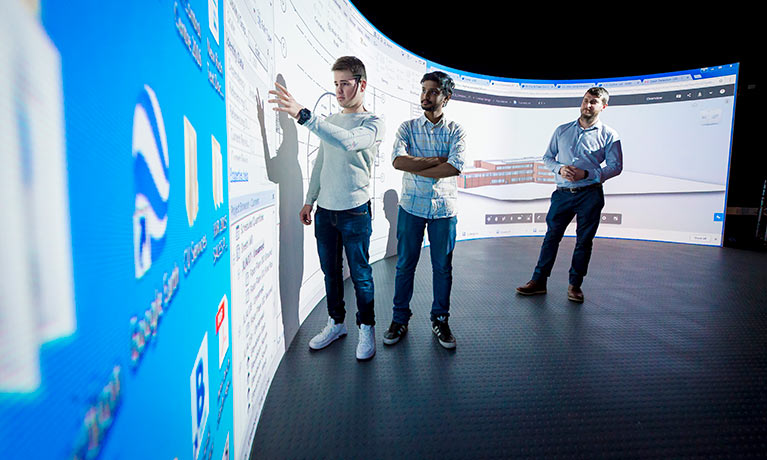
Simulation Centre
You will have access to our Simulation Centre, which incorporates best practice building information modelling (BIM). Using a 3D model, the centre is designed so that you can view and walk through your project to add value, realise efficiencies and ensure every member of the construction team understands what is required of them and when.
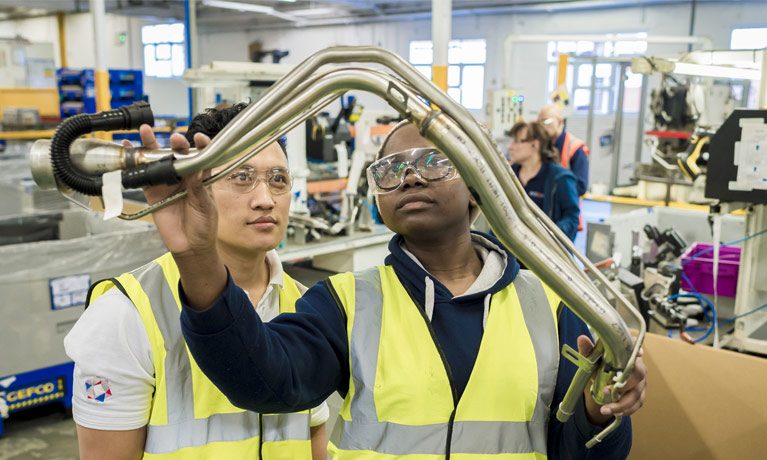
Workshop
For all your model making needs, there are fully equipped workshops with woodworking, 3D printing, laser cutting and CNC facilities in the Beatrice Shilling building.
Facilities are subject to availability. Access to some facilities (including some teaching and learning spaces) may vary from those advertised and/or may have reduced availability or restrictions where the university is following public authority guidance, decisions or orders.
Careers and opportunities
Upon successful completion of this course, you will be equipped with the skills sought after by many employers. In addition to being a fully qualified architectural technologist with a sound knowledge of building technologies, you should have also developed skills in the creative aspects of design and contextual studies. You could find yourself working in architectural practice or decide to proceed to further qualifications on Part 2 and 3 of architecture.
Where our graduates work
- Harrison Design Company, Birmingham
- Kendrick Homes, Stourbridge
- HLP UK Ltd, Cannock
- Spatial Future Architects, Stratford upon Avon
- JNP Architects, Belfast
- St Modwen Homes, Birmingham
The graduate destinations listed above illustrate potential career paths. You may need to gain additional qualifications or practical experience, pass professional examinations, complete training, cover associated costs and meet specific visa or immigration requirements to secure employment in these fields.

Discover Phoenix+
Phoenix+ brings you together with other students to learn, experience and develop essential knowledge and skills. Whatever destination you choose, it's about preparing you for life after university.
Learn more about Phoenix+How to apply
You may also like

Architectural Engineering BEng (Hons)
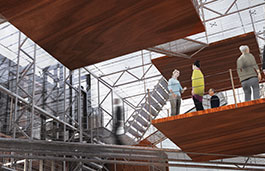
Architecture BSc (Hons)
